 The Demise of The Coin-Operated Video Game Operator
What ever happened to the video game operator who supplied stores with the newest video
Games? It's nearly 33 years since the invention of 'Pong' and the beloved coin-op arcade
machine. Video games will go down as the most popular form of entertainment of the latter
part of the 20th Century and beyond. In the video game heyday of the early 1980's, there
were one and a half million games being operated on 350,000 sites in the US alone - and
at least the same again for the rest of the world.
Can this vender who supplies video games to the neighborhood retail stores survive when
the video games are not supported by the kids like in the Golden Age of the 1980's when
everyone went to their local arcade for entertainment. Have you noticed that you cannot
find any games any more in your local 7/11 convenience store or liquor store or for that
matter in any upscale mall. The kids of today don't even realize that there was a time
when video games were in just about every type of store on every block in America, until
Nintendo Home Entertainment moved in and made arcades a thing of the past. Why even
write about a by gone day of video game routes and video game arcades? Because it is
time to realize how good we had it then and how bad things are now-- relative to
entertainment and fun.
Let's relive the 1980's for a moment and how great it was...
The Demise of The Coin-Operated Video Game Operator
What ever happened to the video game operator who supplied stores with the newest video
Games? It's nearly 33 years since the invention of 'Pong' and the beloved coin-op arcade
machine. Video games will go down as the most popular form of entertainment of the latter
part of the 20th Century and beyond. In the video game heyday of the early 1980's, there
were one and a half million games being operated on 350,000 sites in the US alone - and
at least the same again for the rest of the world.
Can this vender who supplies video games to the neighborhood retail stores survive when
the video games are not supported by the kids like in the Golden Age of the 1980's when
everyone went to their local arcade for entertainment. Have you noticed that you cannot
find any games any more in your local 7/11 convenience store or liquor store or for that
matter in any upscale mall. The kids of today don't even realize that there was a time
when video games were in just about every type of store on every block in America, until
Nintendo Home Entertainment moved in and made arcades a thing of the past. Why even
write about a by gone day of video game routes and video game arcades? Because it is
time to realize how good we had it then and how bad things are now-- relative to
entertainment and fun.
Let's relive the 1980's for a moment and how great it was...
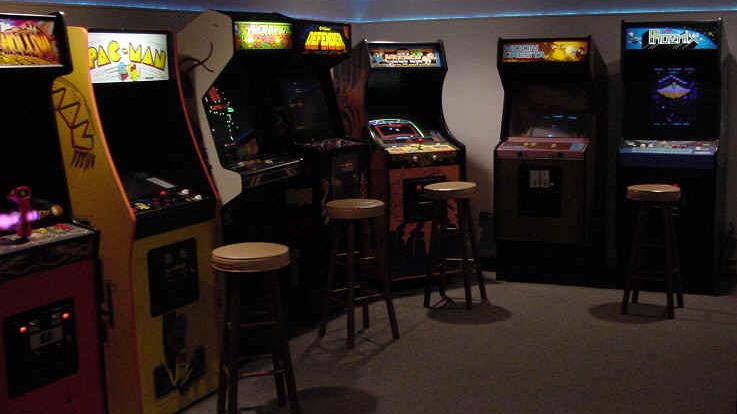 The golden era was a time of unique games that had many different types of controls
to master and most of these games were not re-runs of the fighting theme of Street
Fighter that we have had for the last 15 years. There were neighborhood arcades
with 20 or more games and they were filled with anxious kids learning the latest
techniques to mastering games. This is where the kids bonded and in many cases
became life long friends.
The Beginning of the End of Arcades...
There are many reasons this golden era disappeared and it all began with Nintendo.
After every kid in America had bought the Nintendo Home Entertainment System, they
stopped going to the arcades and so the arcades starting closing their doors one
by one until only the Mega Multi-Functional Arcades existed. These were the
megaplexes that offered Miniature Golf, Amusement Park Rides, Carnivals, and lots
of Cotton Candy, and Carmel Corns.
The golden era was a time of unique games that had many different types of controls
to master and most of these games were not re-runs of the fighting theme of Street
Fighter that we have had for the last 15 years. There were neighborhood arcades
with 20 or more games and they were filled with anxious kids learning the latest
techniques to mastering games. This is where the kids bonded and in many cases
became life long friends.
The Beginning of the End of Arcades...
There are many reasons this golden era disappeared and it all began with Nintendo.
After every kid in America had bought the Nintendo Home Entertainment System, they
stopped going to the arcades and so the arcades starting closing their doors one
by one until only the Mega Multi-Functional Arcades existed. These were the
megaplexes that offered Miniature Golf, Amusement Park Rides, Carnivals, and lots
of Cotton Candy, and Carmel Corns.
 Then came Legislation. The video game arcades that were left became targets of
the Religious Right. There were gaming Curfews and no game could be within 100
feet of an establishment that served alcohol such as a liquor store. This was
called the ABC Ruling.
Now The California Lottery and other lotteries across America. Every 7/11 or other
type of convenience store ousted there video game operator in exchange for a brand
new lottery machine which made much more money than the fledging video game.
These green machines took your money without even saying; "Game Over" in the end.
Then came Legislation. The video game arcades that were left became targets of
the Religious Right. There were gaming Curfews and no game could be within 100
feet of an establishment that served alcohol such as a liquor store. This was
called the ABC Ruling.
Now The California Lottery and other lotteries across America. Every 7/11 or other
type of convenience store ousted there video game operator in exchange for a brand
new lottery machine which made much more money than the fledging video game.
These green machines took your money without even saying; "Game Over" in the end.
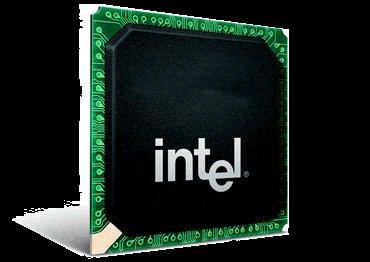 Intel - New Technology
The next movement was the CPU chip movement with Intel in Charge. Every six months
Intel put out a new computer chip which went twice as fast as the prior chip, and
faster and faster home computers became the only thing that mattered for kids who
wanted a quick fix on the latest video game. The gap moved quickly between the
technology of the home computer compared to the technology of the arcade game.
Because the arcade game business was a fledgling and failing industry, no more
software was being written for the arcade machine. The different home systems were
getting faster and more and more popular. Play station, Nintendo and Sega were on
top of their game for home systems. They were even topping the Theater Business
in gross revenues.
Intel - New Technology
The next movement was the CPU chip movement with Intel in Charge. Every six months
Intel put out a new computer chip which went twice as fast as the prior chip, and
faster and faster home computers became the only thing that mattered for kids who
wanted a quick fix on the latest video game. The gap moved quickly between the
technology of the home computer compared to the technology of the arcade game.
Because the arcade game business was a fledgling and failing industry, no more
software was being written for the arcade machine. The different home systems were
getting faster and more and more popular. Play station, Nintendo and Sega were on
top of their game for home systems. They were even topping the Theater Business
in gross revenues.
 The video game gap made the arcade game more of a nostalgia point than a cutting
edge piece of equipment that it was in the early 1980's.
Coin-Op was still a quarter. Ten years after the beginning of the big arcade push,
starting with Asteroids, Pac man, Donkey Kong and Centipede, you could still play for
just a quarter. This put even more pressure of the route operator who had to buy
new equipment every year which went up in price along with inflation while the pricing
of the video game never kept up with inflation.
Corporate America Took Over. Once big food and other retail chains took over, ma and pa
locations went away and so did the classic video games that were in the corner of
their stores. You won't see video games in chain stores because big business thinks
they are too good for the arcade game business. There square footage is better
utilized by another chair or a table or other type of merchandise because the coin-op
game isn't pulling in the big bucks any more.
The video game gap made the arcade game more of a nostalgia point than a cutting
edge piece of equipment that it was in the early 1980's.
Coin-Op was still a quarter. Ten years after the beginning of the big arcade push,
starting with Asteroids, Pac man, Donkey Kong and Centipede, you could still play for
just a quarter. This put even more pressure of the route operator who had to buy
new equipment every year which went up in price along with inflation while the pricing
of the video game never kept up with inflation.
Corporate America Took Over. Once big food and other retail chains took over, ma and pa
locations went away and so did the classic video games that were in the corner of
their stores. You won't see video games in chain stores because big business thinks
they are too good for the arcade game business. There square footage is better
utilized by another chair or a table or other type of merchandise because the coin-op
game isn't pulling in the big bucks any more.
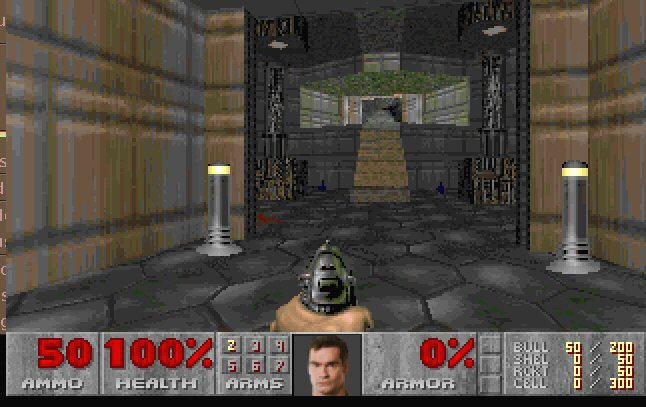 Doom Video Game Get Bad Rap
Video Games get a bad rap. After the Columbine tragedy, it is said that video games
are the root to evil because the kids who killed all of there high school classmates
learned how to shoot guns by playing the violent game, "Doom" whose goal was to shoot
others before getting shot. It is thought that only drug dealers and derelicts hang
out at the few arcades that are left. It was thought to be a gang hangout rather
than an entertainment center for the family. Soon after that, the arcades became
vacant lots to be later made into large office complexes and other industrial endeavors.
So where is the video game operator today in 2005 and where is this business
going to be by 2010?
Nowadays the video game operator can still put video games out but in a very select
few locations. You might see games in laundry mats or independent businesses like
video stores, Mexican food restaurants, and pizza parlors. But the games are
becoming fewer, and being replaced by redemption games that pay out a prize.
Redemption Games Center
Doom Video Game Get Bad Rap
Video Games get a bad rap. After the Columbine tragedy, it is said that video games
are the root to evil because the kids who killed all of there high school classmates
learned how to shoot guns by playing the violent game, "Doom" whose goal was to shoot
others before getting shot. It is thought that only drug dealers and derelicts hang
out at the few arcades that are left. It was thought to be a gang hangout rather
than an entertainment center for the family. Soon after that, the arcades became
vacant lots to be later made into large office complexes and other industrial endeavors.
So where is the video game operator today in 2005 and where is this business
going to be by 2010?
Nowadays the video game operator can still put video games out but in a very select
few locations. You might see games in laundry mats or independent businesses like
video stores, Mexican food restaurants, and pizza parlors. But the games are
becoming fewer, and being replaced by redemption games that pay out a prize.
Redemption Games Center
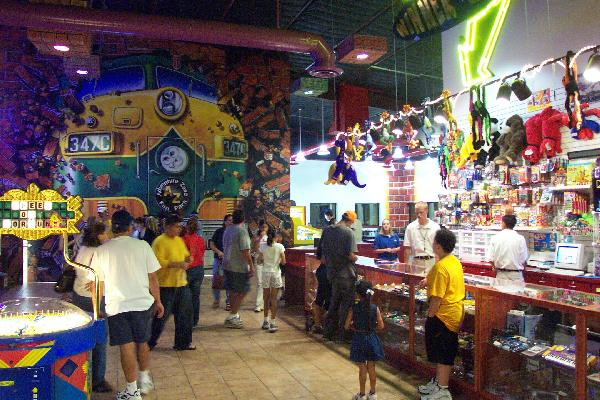 The arcade operator still has sky rocketing costs and no way to get the return
that was easily made in the 1980's. a video game that took three months to
pay off in 1980 would take a year to pay off in 1985, and now in 2005, it will take
two and a half to three years to see a return on the price of the video game if
you're lucky.
The only reason there are games around at all is because of the video game operator
who refuses to close his doors in order to keep the 1980's alive, which is the
golden ideal of being able to play a game for a quarter and to be able to meet
with the last few people who still play a game or two at the independent arcade
or in one of the last ma, pa restaurants. Games have even dropped down below a
quarter to a nickel in order to keep the arcade open. The nickel nickel arcades
are thriving but for how long?
In 2010 I see a further demise of the coin-operated video game because it isn't being
supported by the general public or by industry. About every 10 years there is one
game that does really well for about a year and then everybody jumps into the
band wagon and starting putting video games out just in time for another big
crash in the industry. The cycle of the coin operated industry started with Atari
in 1972 for the first boom. Then came pacman in 1981 for the second boom. Along
came Street Fighter for the third boom in 1991 and then came Dance Dance Revolution
in around 2001 which was a dance game instead of a video game but it still takes
quarters so we are counting it as well. Besides that game, business has been bleak
for all in the arcade video game business.
Now the Retro Game is here...
New Retro Game
The arcade operator still has sky rocketing costs and no way to get the return
that was easily made in the 1980's. a video game that took three months to
pay off in 1980 would take a year to pay off in 1985, and now in 2005, it will take
two and a half to three years to see a return on the price of the video game if
you're lucky.
The only reason there are games around at all is because of the video game operator
who refuses to close his doors in order to keep the 1980's alive, which is the
golden ideal of being able to play a game for a quarter and to be able to meet
with the last few people who still play a game or two at the independent arcade
or in one of the last ma, pa restaurants. Games have even dropped down below a
quarter to a nickel in order to keep the arcade open. The nickel nickel arcades
are thriving but for how long?
In 2010 I see a further demise of the coin-operated video game because it isn't being
supported by the general public or by industry. About every 10 years there is one
game that does really well for about a year and then everybody jumps into the
band wagon and starting putting video games out just in time for another big
crash in the industry. The cycle of the coin operated industry started with Atari
in 1972 for the first boom. Then came pacman in 1981 for the second boom. Along
came Street Fighter for the third boom in 1991 and then came Dance Dance Revolution
in around 2001 which was a dance game instead of a video game but it still takes
quarters so we are counting it as well. Besides that game, business has been bleak
for all in the arcade video game business.
Now the Retro Game is here...
New Retro Game
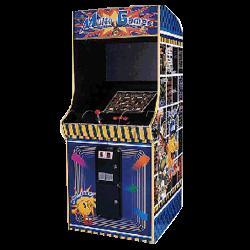 All The Classics Are Back!
Because of the new technology and the generation X kids now in their 30's and 40's,
who want to relive their childhood, they now can. You can have one retro cabinet
with 39 of the classic video games you once played inside just for you and your
game room. Not to mention, many other types of games are being reproduced for those
who want to relive the 1980's. Pac man is back as well as many others all jam packed
into different specialty cabinets. This doesn't help the Arcade much or the Video
Game Coin-Operated Route vendor unless they start selling these retro games on the
side to make up for the short fall in their routes. This is exactly what is happening
to make ends meet in many shops around the country. Many are rebuilding the classic
games and selling them to home owners who yearn for the simpler times of the 80's,
when arcade games were simple yet hard to master and fun to play.
Is the route guy the way of the wind because technology has pasted him by? Are the
1980's really over? When automobiles came out the first person that was displaced
was the buggy whip salesperson. This is the route guy who peddles his arcade video
game business but nobody is buying because these games don't compete with the home
market which is at least three to four generations ahead. Gone are the days of
the rotary dial phone and the pez dispenser. There is no more disco ball and things
are no longer cool... they are off the chain... what ever that means. Hopefully
we won't lose all of our identity by moving past are heritage of the arcade video
game and all of the fun we had along the way.
History lost to the Cappuccino bar and of faster moving times...
All The Classics Are Back!
Because of the new technology and the generation X kids now in their 30's and 40's,
who want to relive their childhood, they now can. You can have one retro cabinet
with 39 of the classic video games you once played inside just for you and your
game room. Not to mention, many other types of games are being reproduced for those
who want to relive the 1980's. Pac man is back as well as many others all jam packed
into different specialty cabinets. This doesn't help the Arcade much or the Video
Game Coin-Operated Route vendor unless they start selling these retro games on the
side to make up for the short fall in their routes. This is exactly what is happening
to make ends meet in many shops around the country. Many are rebuilding the classic
games and selling them to home owners who yearn for the simpler times of the 80's,
when arcade games were simple yet hard to master and fun to play.
Is the route guy the way of the wind because technology has pasted him by? Are the
1980's really over? When automobiles came out the first person that was displaced
was the buggy whip salesperson. This is the route guy who peddles his arcade video
game business but nobody is buying because these games don't compete with the home
market which is at least three to four generations ahead. Gone are the days of
the rotary dial phone and the pez dispenser. There is no more disco ball and things
are no longer cool... they are off the chain... what ever that means. Hopefully
we won't lose all of our identity by moving past are heritage of the arcade video
game and all of the fun we had along the way.
History lost to the Cappuccino bar and of faster moving times...

 Woolworths Department Store, a get together spot for lunch where many seniors met each other.
Wouldn't you like to go back in time and see all of these things again? I'd like
to see an Golden Era Amusement Park with all the old stuff in it including the
Woolworths Chocolate Shakes on the bar stool at the grill with seniors serving who
have been there for 50 years and aren't considered beyond their years. Wouldn't it
be nice to go through a mall that wasn't the same as every other mall all over America,
but instead had some originality with a few independent stores with employees actually
over the age of 18.
Hi-C the cool drink from the past
Woolworths Department Store, a get together spot for lunch where many seniors met each other.
Wouldn't you like to go back in time and see all of these things again? I'd like
to see an Golden Era Amusement Park with all the old stuff in it including the
Woolworths Chocolate Shakes on the bar stool at the grill with seniors serving who
have been there for 50 years and aren't considered beyond their years. Wouldn't it
be nice to go through a mall that wasn't the same as every other mall all over America,
but instead had some originality with a few independent stores with employees actually
over the age of 18.
Hi-C the cool drink from the past
 1980's Ghost Busters Monster Theme
So please support your local coin-operated video game before it disappears into
oblivion like all of the other cool stuff we had in the Golden Era. Have a nice
day and thanks for coming along, it was nice to walk down memory lane with you.
Paul Dean
------------------------------------------------------------------------------------
Other Views on The Decline of Arcades and the Decline of the Arcade Game Operator
Link
-------------------------------------------------------------------------------------
Shoryuken.com Forums > The Dojo > Domination 101
Ponder #1 07-07-2003, 11:26 AM
SRK Tournament Director
XBL Gamertag: Ponder
Location: Mountain View, CA
The Once and Future Arcade
---------------------------------------------------------------------------------------
An Act restricting the use of certain video games and supplementing chapter 33
of Title 2C of the New Jersey Statutes.
I want to talk about something slightly bigger than just winning at SF today, but
something I suspect is of interest to all of us anyway- the status and future of
arcades. I was inspired by the remarkably shoddy discussion of same that I had the
misfortune to read on Gamespot. What's most depressing is that this simplistic, lazy,
and ultimately worthless piece was the product of a combined effort by the entire
editorial staff of one of the popular sites in the gaming world. [editor's note:
Gamespot's original story can be found at:
http://www.zdnet.com/gamespot/stori...2686662,00.html]
Is this really the best that can be done? Is the current state of thinking about
arcades really this pathetic? No wonder they're in trouble.
That's what we agree on: arcades aren't doing nearly as well as they once were. The
further question is "why?". Here's where the gamespot think-tank and I part ways.
Their claim (re-iterated by essentially all of the authors) is that arcades "can't
compete" because their games used to be technologically superior to home systems,
but aren't anymore. In a nutshell, they're claiming that people aren't willing to
pay for what they can get "for free" at home (we'll ignore for the moment that the
cost of a newish console + games is hardly "free"). A lot of arcade-goers have noticed
the same thing, and have probably been satisfied by the same explanation. Should you
be? My claim is: "no".
In fact, I think this is a terrible answer. By "terrible" I don't mean simply wrong-
instead I mean that it's incomplete, lazy, and totally unilluminating. It's an answer
that no one who actually cares about the question should be happy with. While it's
obvious that the development of consoles has affected the arcade industry, it's hardly
the whole story- or even particularly important. When you look at this from a business
perspective (which is the whole point- the failure of arcades is a business phenomenon),
ask yourself- does this line of reasoning ("why pay when I can get it at home for free?"),
in itself, explain the failure of the business? Since neither Gamespot nor anyone else
of whom I'm aware offer anything else, they apparently think it does.
Blaming consoles because "they let you play the same thing for free!" goes wrong in at
least two serious ways. First, it doesn't explain why the same thing doesn't seem to
affect other industries of which EXACTLY the same thing is true. Take for instance the
absolute *explosion* of coffee houses over the last few years. Gamespot reasoning: "Can't
people get coffee at home? Virtually everyone has a coffee machine- and they're cheap,
too. Sure, the coffee houses have fancy machines with lots of chrome- but that's
essentially just a gimmick, right? It's still coffee. And 3$ a cup?! Who do these coffee
places think they're kidding? No thanks- I think *I'll* just stay here and drink my
perfectly-good coffee in the comfort of my own home!". Seems "logical" enough, right?
So coffee houses then too are doomed? And what about of our precious pubs and taverns! What
will become of these community pillars if (as liquor transportation technology continues
to advance) we're someday able to transport beer into our own homes? Will they be reduced
to nostalgic memories as well? The Gamespot editors (and anyone else who wants to single
out consoles) owe us an explanation of why these (and MANY other) industries are somehow
immune to the problem. The second way merely blaming consoles goes wrong is this: It
doesn't explain the history of the arcade business. If you'll recall, arcades were in
an even more serious recession around 1991, only to be saved almost single-handedly by
Street Fighter 2, and the successive wave of fighting games. Despite major advances,
consoles of the time were a *far* cry from real arcade machines. So arcades seem subject
to disaster quite apart from home systems co-opting their product. The lack of enthusiasm
was coming from somewhere else.
Next: The complaint that the modern arcade is filled with "gimmicky" games with specialized
cabinets/interfaces? ALL the old favorites the editorial staff reminisce so fondly about
were "guilty" of EXACTLY the same thing they're criticizing in modern games. From
Defender's insane controls, to Tron's annoying "dial+trigger stick" all the way up to
the six buttons (! remember when that used to be a lot?) on Street Fighter 2 and beyond,
arcade games have ALWAYS had specialized, frequently non-interchangable controls, which
could often not be replicated at home (much less the games themselves). Suggesting that
games today are degenerate merely for committing the same "crime" is- what?- you know
the answer by now- that's right!- it's dumb. It's thoughtless. It's lazy because it
ignores history. Simply crying "gimmick!" as a criticism is ridiculous.
A non-ridiculous criticism would be that these "gimmicky" games are also BAD games.
Unfortunately for the Gamespot team, however, many games that have specialized interfaces
are still good (obviously SOME suck, but the percentage of gimmicky games that suck seems
roughly similar to the percentage of more standard, you-could-play-this-on-a-pad-at-home
games that suck (re: most, but not all)). Some are even better than good. Dance Dance
Revolution, for instance, is a truly excellent game. It's fun, extremely interactive,
challenging, addictive, competitive (or cooperative!), and even healthy, boasting a huge
following despite a US "release" so limited that it scarcely deserves the name. It's also
the #1 money-maker in most of the arcades that it's made it to. These "gimmicky" games
aren't using the interface as a substitute for an interesting game- the interface is an
integral part of the game itself. Ignoring this and dismissing them as "gimmicks" is just
more laziness- maybe okay for Senator Lieberman and co., but unacceptable from gaming
"professionals".
A lot of explanations for the decline of arcades simply overlook the very obvious.
Remember back to the heyday of arcades... Remember who ran them? Almost universally,
they seemed to be run by remarkably unpleasant troll-like men, who (apart from their
overwhelming greed) were distinguished primarily by the fact that they didn't like games,
and they didn't like the people who played them. A lot of them came from the vending
machines business, and most of them seemed like they wished they'd never left. Their
new arcade "businesses" typically consisted of renting a dank hole someplace, often in
shady neighborhoods, and then just cramming the games in there. Voila! Instant money.
Some arcades noticed that they could continue to rake in the cash without even doing
things like bothering to repair obviously broken machines (the vast majority of arcade
employees are completely incapable of even the simplest of repairs). Better still, they
could be openly hostile to their customers! Should it really be such a surprise to see
a lot of "businesses" like this fail? Especially when you consider that as their clientele
ages, they become less interested in being openly and needlessly abused? Can you imagine
a restaurant with the same kind of service? Should we blame its failure on advances in
refrigerators and improved home-cooking? Please. A lot of arcades fail because they're
badly run by non-geniuses out for a quick buck, who neither like nor remotely understand
their product. Duh.
Contrast this with, for instance, Southern Hills Golf Land's operator, John Bailon. He
runs a premier arcade with a steady business, home to some of the greatest players in
the country. He does such shocking things as (gasp!) *talking to the players*. He finds
out what games appeal to them, then gets those games. He performs *routine* maintenance
on games, sometimes replacing parts even before they've broken (standard operating
procedure just about anywhere else, but unheard of in arcades). He also runs simple
promotions like tournaments that encourage people to come in a little more than they
might otherwise. And he's a success. Maybe people in LA just don't know about consoles
or something, right?
Arcades have also completely failed to promote themselves. In "the good 'ole days", it
seemed as though the games needed no advertisement. They were so irresistible that people
would go anywhere to play them. This is no longer true, but arcades continue to act as
if it were. There's been essentially NO effort at promotion whatsoever, despite their
diminishing profits. To this day, about the most advanced marketing technique you see
from an arcade has been some kind of pathetic "special" deal on tokens. Even today,
sickeningly enough, tournament organizers in some locations actually have to hunt for
arcades even willing to host them. Operators are so resistant to the idea of change, much
less doing ANY extra work that they're happy to pass on the chance to generate easily
10x their ordinary business. I mean, think about it- you see ads for EVERYTHING. But do
you ever see ads for arcades? I haven't. Ever. For that matter, do you see ads for arcade
games? Nope. The only people who see those, are the arcade operators themselves. Apparently
Capcom/Namco/Konami, etc, seem to think that once they've sold the machines to the arcades,
their job is done. In one (very short-sighted) sense, this is true. However, in a market
em to realize this as far as console games are concerned (even where the "console game"
is an EXACT PORT of the arcade version), yet nothing seems to be spent on their arcade
counterparts. Apparently that job falls to the operator alone, and the operators simply
aren't doing it.
The early success of videogames seems to have bred some incredibly bad industry habits in
arcade operators. The initial arcade craze was powered by games that people played
compulsively, against the computer. For the most part, these tended to be relatively
simple. It wasn't graphics that made these games popular- it was a more basic cleverness
behind them. This, however, plays directly into the hands of consoles. If you want to
obsess over some puzzle game, you don't need anyone else around to do it, and you also
don't need a very sophisticated piece of hardware. This is part of what I suspect was
behind the initial decline in arcade revenues, and should have been a lesson learned.
Competition (in fighters like SF2) revived the industry, because you couldn't get that
by yourself, or even at home (and you still can't, with at least a lot of popular titles-
there's still no national network in place in the US, internet speeds simply aren't good
enough for a lot of games, and all of this still omits the face-to-face factor, which can
be a lot of the fun). However, success again spawned a still larger number of games, and
constant imitation of successful titles. Both of these things make sustained, focused
competition that saved the arcades difficult to maintain. With everyone taking a small
slice of the player base, there's less people to push things to the next level on any
particular game. With a market as crowded as today's, operators can hope for that lucrative
intense competition in two ways. They can wait until a game comes along that's so magical,
so involving, that people everywhere can't stay away. Good luck on that front. The other
way is with some damn promotion. Does anyone remember Capcom's "Saturday Night Slammasters"?
Probably not. It was a strange wrestling game/fighter hybrid, featuring none of wrestling's
actual celebrities, and while moderately interesting, was nothing to get very excited
about. What was something to get excited about was the fact that Capcom sponsored a national
tournament for the game, which brought players out in droves. Without question, the cost
for the entire promotion was less than the cost of a few simple print ads, yet it drove
the players in many areas into a complete frenzy over an otherwise unexceptional game (the
success of the national Tekken Tag tournament was another more recent example). There
seems to be absolutely no reason the same thing can't work again, and *especially* because
no one else is doing it.
Gameworks and Co. have succeeded not simply because they have games you just can't play
at home ("gimmick" games)- they succeed because they create an exciting environment where
people can be together, and enjoy themselves. Quite apart from the games, just take a
look at the place: it's nice. It's comfortable. It's not dangerous. There's a reasonably
competent, courteous staff. People can be around each other, and the games. What's most
amazing about Gameworks is that it has succeeded even WITHOUT even being particularly
concerned about catering to the historical core gaming demographic of teens and guys in
their early 20s. Instead, they targeting instead older adults and their kids, creating
a new market. They seem to have realized the very obvious fact that people like going
out to interesting places, to be around (physically) other people, and to interact. They're
willing to use almost anything as an excuse to do so. Games happen to be one such excuse-
and apparently a good one (that's part of why fighting games were the smash they were-
you're beating someone down directly- not judged by something as inert and impersonal as
a score, but by outwitting the person themselves. It's not "which of us is better able to
beat this simplistic CPU?", but "which of us is able to beat the other person one on one,
directly?". Scoring doesn't matter- the game doesn't even record your margin of victory-
flawless victory or down and dirty- a win was a win). The experience of the game itself
is, for a lot of an arcade's patrons, pretty secondary. Before I became a Street Fighter
addict, I liked to go to the arcade just because it was the arcade. It was fun. Sure, all
my favorites were there, but it was the magic of the place at large, and the people there
that were a major draw. The editors tip-toe around this point, but can't seem to zero in
on the obvious. Whether they're remembering the old social aspect of arcades, or discussing
the mystery of people still paying 10$ a ticket to see a movie when you could rent it on
DVD, they still manage to brilliantly overlook the simple fact that *people like going
out to be near other people* (it's bizarre, but true- despite all the annoyances that
come with seeing a movie in public, it's still a lot of fun, and a more profitable as a
business than ever). Arcades are an ideal venue to capitalize on this fact.
Even apart from Gameworks, you can see that people still crave the interaction of the
arcade experience. Case in point? This site. In many ways, it's a forum for top and
aspiring players to know about each other, and to have their own love for the game
affirmed by the fact that there are others who take it (and play it) seriously. Everyone
has a good time, but we work at these games. It fosters an environment of excellence,
and since tournaments are the furnace that shape top play, that's what you get. All of
the discussion, etc, culminates in major tournaments. And there are uncountable many
more, and better attended tournaments this year than there have ever been since the
height of SF2's popularity. When you factor in the incredible level of information-
sharing and understanding of the games (movies, tactics, technical and strategy articles,
etc.) now as compared to then, it's never been better. What prompted this renaissance?
Some mind-bogglingly great new game? Hardly. With the exception of MVC2, recent Capcom
fighters have been relatively minor advances at best, or even literal steps backwards
(CVS). Not the stuff that generates activity like we've seen this year. It's the experience
of real tournament interaction and play itself that's exciting. It's *so* exciting to the
true fans and players that they're willing to go cross-country- even across oceans- to
play each other. Directly. In the spirit of that OG arcade competition. And they have a
great time doing it (as evidenced by the fact that virtually everyone who starts going
to tournaments, KEEPS going to tournaments- they're infectiously great).
The real greatness of this experience is precisely what sets me off when I see limp-wristed
stuff like the Gamespot article. Though they obviously don't understand them, these guys
at least seem to remember the magic (they all wax nostalgic about the good 'ole days- some
even claim to still like arcades!). However, they're precisely the one's who've abandoned
it (one admits he hasn't even *been* to an arcade in years). They've turned away from
arcades, preferring to stare into their own navels (er, consoles). Not only does this
encourage the (in many ways undeserved) image of videogames as anti-social, it also actually
puts another nail in the coffin of the arcades they claim to love. They're doing this by
helping to perpetuate a cycle: Given the amount of coverage they get in the American gaming
press (the Japanese press does not have this problem, their arcades and tournaments get
plenty of attention, and (curiously?)- their arcades have always been far more popular), it
seems safe to assume that no one's at the arcades anymore- they're all home on consoles,
screwing around with secret codes, etc. Since no one's at the arcade, there's no reason to
go, and so on. The truth is, however, that there ARE people at these arcades- some of the
best players in the world, in fact. But instead of investigating, the gaming press sees fit
to jam their pages with the coolest new code for an alternate costume color, and the latest
rumors about Over hyped Letdown IX, which will be in development for the next three years
("Tips and Tricks" being the notable exception, and their excellent arcade tournament
section seems to grow every month). Is that really what loving games is all about? It's
easy to understand how these guys could overlook the action. It gets a little easier when
you don't leave home. At home, you see, you can avoid getting that whipping your feeble
skills deserve. You can continue to believe you're good merely because you can "beat" a
game (on max difficulty even!), or do a bunch of combos, or even unlock some special modes!
It makes me sad that people as intimately involved with games as these editors could be
so confused, and willfully oblivious to what truly playing is all about.
So do I mean then that increased publicity is the solution to all of the woes facing
today's arcades? Hardly. But it IS a way for the Gamespot editors to stop contributing
to the problem they're complaining about, and to encourage the revival they claim to want.
Simple-mindedness like "umm... consoles are just too good!" doesn't help anything- the
pretty game may draw them in, but the atmosphere- the competition- is what can keep them
coming back and that's not available only via gimmicks, or games for kids and lightweights.
Stick to your s33krit l33t c0d3z, boys
_______________________
"Guardian Guardian Guardian of the Blind!"
Gamertag-Thrillh0use
Gamma Ray
[COLOR=skyblue]It's a good thing Deejay (plutoburn) directed me to this part of the
forum to see these kinds of threads. You should have a publishing deal by now.
The thing is, the idea about consoles being the main factor in the death of arcades, is
very true. It is a sad reality, especially since I dislike -Next Generation- consoles
(PC for life). The dream for many game players though in the late 80's early 90's, was
to have arcade games at home. The big problem was, that the consoles couldn't handle
the power. The ports were very crimped up versions of what you played in the arcade,
so people kept going the arcade for the real deal.
When Saturn came out with a graphics chip the same power as the arcades (32bit)), you
could see the potential of home conversion. X-men children of the atom was a perfect
example of having close to the actual arcade game in your home. The real beginning to
the end of arcades was, Namco's Soul Caliber on Dreamcast. The game was actually a better
version than the arcade. Finally, the dream of arcade quality games in the home for many,
were realized.
Now it's not a matter of people thinking about having the arcade game at home for free,
cause it cost a premium to obtain in the first place. The idea though, of paying one
price to own the game forever at home, pays for it self over the long run of going to
the arcades and putting money in all day. The comparison of other industries like coffee,
actually proves the console destroying arcade theory. Coffee houses have one thing you
can't get in your home on a consumer level, professional equipment and ingredients.
You cannot obtain the same coffee grounds and machinery that the houses have, so the
quality of home brew is still way off the house level. Think of pizza joints, they
have pizza ovens, which are almost the back bone of the quality taste you can't get
from your oven. If we could get a pizza oven and industrial pizza ingredients, then
the same thing would start to happen to parlors as is with arcades.
The revival of arcades in the 90's because of Street Fighter 2 is correct, but, it
actually revived the gaming industry in general. Think about it, what if Street Fighter 2
was released as a console game on SNES, the same effect would have happened and the arcade
industry actually might have died then. Remember Street Fighter 1, how come that didn't
save the arcade industry from slipping in '87. When Street Fighter 2 was released on SNES,
it broke sales records and why, because people wanted it to be at home. If people really
liked the idea of Street Fighting in the arcades as it was released on that platform
first, why would the SNES version sell tens of thousands of copies?
Home gaming is what actually kept arcades alive; remember Donkey Kong and Mario Bros.
They became even more popular when they were released to home consoles. Atari wasn't
huge because of arcades, it was because of its home console. Arcades have actually been
used as public advertisements for games and as public tests to see what games would be
cash-cows for the home market. The real money for companies wasn't in the arcade units
(they were mostly rented), it was home console.
The arcade stayed alive too, because of the power. Even though people had the home
version of the game, They like to see the better graphics and sound still. The day came
with Dreamcast, and the arcade units finally met their match. So what next, virtual
games. The arcades couldn't prove to people anymore why they should put quarters in,
to play straight 2d-3d games compared to console. Arcades had one advantage, customization.
The cabinets can be designed any which way you want. Games like Dance Dance would succeed,
because a mat for the PS2 is not the same as the stand-up arcade unit. Now all the keep
arcades alive, are specialty games, like hand gliding and fire fighting and fishing etc.
Problem with reality games is, the masses don't care about them. So the arcades hadn't
a leg to stand on. Alot of big companies didn't just do arcade ports, they developed games
for consoles. Midway saw so much potential in the next-gen consoles, that they straight up
left the arcade side and concentrated the entire effort to consoles (Mortal Kombat 5).
Capcom is now next in line, Sega is already there and many arcade companies have long
perished (Data East).
Side Note: Notice alot of fighting game ports from arcade, always had extras in the
console, like; hidden/extra players (PSone SFA3). This was another sign that the big
companies saw consoles as there market.
We can see, but not have to like the fact that the next-gen consoles are the largest
reason for the fall of arcades. There are other smaller factors like the mid 90's
generation of kids was exposed to Windows95 and the internet. Kids having a higher
income than us in the 80's, so they worry more about buying cell-phones and clothes
than going to arcades.
All in all, consoles became the grim reaper for arcades and the arcade era is not coming
back in our life time. Sega risked its entire future on a console, yet they were arcade
pioneers (Shinobi). That tells anybody, that even an arcade pioneer, knew that the future
of gaming was the console.
PC's for life, because what, Emulators. At least in that sense, we will always have the
true arcade games, long after the final cabinets disappear. Rest in peace, I say to the
arcade industry, memories I can never forget. SF2 for life, Double Dragon, Ninja Gaiden,
Time Soldiers. How can you replace those? I stopped my console madness after the original
Playstation and turned to the mighty PC. I will not be a part of the console fraud and I
will never forget the console industry, for the death of what is engraved in our minds
forever.
A r c a d e[/COLOR]
-------------------------------------------------------------------------------------
DIA operator pulls most-violent video games School deaths intensify
pressure on industry Link
By Kevin Flynn
Denver Rocky Mountain News Staff Writer
--------------------------------------------------------------------------------
The operators of the game room at Denver International Airport say violence in video
games has become a hotter issue all over the country since the Columbine High School
killings.
But Bill Beckham of Toledo, Ohio, said the industry had been faced with serious
questions over game violence for at least two years.
Beckham and his partner, Dan Lopez of Parker, removed several games that involved
killing and other violence this week after Rep. Scott McInnis, R-Colo., complained
about it to Denver Mayor Wellington Webb.
Lopez said he immediately agreed to remove some of the games in question, and that
the Columbine killings had had a profound impact on his own family. He has four
children.
"It opened our eyes to a lot of things even in my own family," he said.
Beckham operates video game rooms in Ohio and Michigan as well. He is a member of
an industry group that deals with issues such as violence.
"We haven't bought certain games because of this," he said. "Several we've taken
a pass on."
Beckham also said the operators have asked manufacturers to come out with a warning
system. Some games already come with a parental advisory.
"Columbine did escalate the public awareness of this," he said.
May 29, 1999
-------------------------------------------------------------------------------------
Further Superior Court Restrictions on Coin-Operated Video Games Below: Link
ASSEMBLY, No. 2849: Restrictions On The Coin-Operated Video Operator
STATE OF NEW JERSEY
209th LEGISLATURE
INTRODUCED OCTOBER 12, 2000
-------------------------------------------------------------------------------------
2. a. It is unlawful for an operator to knowingly show, display, exhibit or permit the
showing, display or other exhibition of a coin-operated video game which contains
harmful graphics in a public place as defined in section 2 of P.L.1992, c.132
(C.40:48-2.52), on or near the premises of the operator's business, to a person
under the age of 17 years.
b. It is unlawful for any operator to knowingly allow a person under the age of 17
years who is not accompanied by his or her parent, guardian, or custodian to be
exposed to more than an incidental view of an arcade video game that displays
harmful graphics or to allow such person in the partitioned area required under
subsection d. of this section.
c. It shall be unlawful for an operator to make available to patrons any coin-operated
video game displaying harmful graphics unless each such game displays a conspicuous
sign indicating that the game may not be operated by a person less than 17 years of age.
If such video games are displayed together in an area separate from games that do
not contain harmful graphics, a single conspicuous sign in that area or at the entrance
to that area may be used to mark the group of games for purposes of this subsection.
d. It shall be unlawful for any operator to make available to patrons any coin-operated
video game that displays harmful graphics within 10 feet of a coin-operated video game
that is not displaying harmful graphics. Games containing harmful graphics shall be
separated from other games by some form of partition, divider, drape, barrier, panel,
screen or wall that completely obstructs the view of persons outside the partitioned
area of the playing surface or display screen of the games that display harmful graphics.
3. If there is a dispute as to whether a particular coin-operated video game shall be
restricted, the operator may apply to the Superior Court for a declaratory judgment.
4. A person who violates this act shall be fined no less than $200 or more than $1,000
for the first violation. A person who has been cited for a second or subsequent
violation shall be fined no less than $1,000 or more than $3,000 for each violation.
5. The provisions of this act shall not be applicable to any coin-operated video game
that is on premises licensed for the sale of alcoholic beverages pursuant to Title
33 of the Revised Statutes and on premises where entry is limited to persons who
are 17 years of age or older.
-------------------------------------------------------------------------------------
Thank you,
Paul Dean, spy hunter champion, Millennium June 28, 1985
www.spyhunter007.com
1980's Ghost Busters Monster Theme
So please support your local coin-operated video game before it disappears into
oblivion like all of the other cool stuff we had in the Golden Era. Have a nice
day and thanks for coming along, it was nice to walk down memory lane with you.
Paul Dean
------------------------------------------------------------------------------------
Other Views on The Decline of Arcades and the Decline of the Arcade Game Operator
Link
-------------------------------------------------------------------------------------
Shoryuken.com Forums > The Dojo > Domination 101
Ponder #1 07-07-2003, 11:26 AM
SRK Tournament Director
XBL Gamertag: Ponder
Location: Mountain View, CA
The Once and Future Arcade
---------------------------------------------------------------------------------------
An Act restricting the use of certain video games and supplementing chapter 33
of Title 2C of the New Jersey Statutes.
I want to talk about something slightly bigger than just winning at SF today, but
something I suspect is of interest to all of us anyway- the status and future of
arcades. I was inspired by the remarkably shoddy discussion of same that I had the
misfortune to read on Gamespot. What's most depressing is that this simplistic, lazy,
and ultimately worthless piece was the product of a combined effort by the entire
editorial staff of one of the popular sites in the gaming world. [editor's note:
Gamespot's original story can be found at:
http://www.zdnet.com/gamespot/stori...2686662,00.html]
Is this really the best that can be done? Is the current state of thinking about
arcades really this pathetic? No wonder they're in trouble.
That's what we agree on: arcades aren't doing nearly as well as they once were. The
further question is "why?". Here's where the gamespot think-tank and I part ways.
Their claim (re-iterated by essentially all of the authors) is that arcades "can't
compete" because their games used to be technologically superior to home systems,
but aren't anymore. In a nutshell, they're claiming that people aren't willing to
pay for what they can get "for free" at home (we'll ignore for the moment that the
cost of a newish console + games is hardly "free"). A lot of arcade-goers have noticed
the same thing, and have probably been satisfied by the same explanation. Should you
be? My claim is: "no".
In fact, I think this is a terrible answer. By "terrible" I don't mean simply wrong-
instead I mean that it's incomplete, lazy, and totally unilluminating. It's an answer
that no one who actually cares about the question should be happy with. While it's
obvious that the development of consoles has affected the arcade industry, it's hardly
the whole story- or even particularly important. When you look at this from a business
perspective (which is the whole point- the failure of arcades is a business phenomenon),
ask yourself- does this line of reasoning ("why pay when I can get it at home for free?"),
in itself, explain the failure of the business? Since neither Gamespot nor anyone else
of whom I'm aware offer anything else, they apparently think it does.
Blaming consoles because "they let you play the same thing for free!" goes wrong in at
least two serious ways. First, it doesn't explain why the same thing doesn't seem to
affect other industries of which EXACTLY the same thing is true. Take for instance the
absolute *explosion* of coffee houses over the last few years. Gamespot reasoning: "Can't
people get coffee at home? Virtually everyone has a coffee machine- and they're cheap,
too. Sure, the coffee houses have fancy machines with lots of chrome- but that's
essentially just a gimmick, right? It's still coffee. And 3$ a cup?! Who do these coffee
places think they're kidding? No thanks- I think *I'll* just stay here and drink my
perfectly-good coffee in the comfort of my own home!". Seems "logical" enough, right?
So coffee houses then too are doomed? And what about of our precious pubs and taverns! What
will become of these community pillars if (as liquor transportation technology continues
to advance) we're someday able to transport beer into our own homes? Will they be reduced
to nostalgic memories as well? The Gamespot editors (and anyone else who wants to single
out consoles) owe us an explanation of why these (and MANY other) industries are somehow
immune to the problem. The second way merely blaming consoles goes wrong is this: It
doesn't explain the history of the arcade business. If you'll recall, arcades were in
an even more serious recession around 1991, only to be saved almost single-handedly by
Street Fighter 2, and the successive wave of fighting games. Despite major advances,
consoles of the time were a *far* cry from real arcade machines. So arcades seem subject
to disaster quite apart from home systems co-opting their product. The lack of enthusiasm
was coming from somewhere else.
Next: The complaint that the modern arcade is filled with "gimmicky" games with specialized
cabinets/interfaces? ALL the old favorites the editorial staff reminisce so fondly about
were "guilty" of EXACTLY the same thing they're criticizing in modern games. From
Defender's insane controls, to Tron's annoying "dial+trigger stick" all the way up to
the six buttons (! remember when that used to be a lot?) on Street Fighter 2 and beyond,
arcade games have ALWAYS had specialized, frequently non-interchangable controls, which
could often not be replicated at home (much less the games themselves). Suggesting that
games today are degenerate merely for committing the same "crime" is- what?- you know
the answer by now- that's right!- it's dumb. It's thoughtless. It's lazy because it
ignores history. Simply crying "gimmick!" as a criticism is ridiculous.
A non-ridiculous criticism would be that these "gimmicky" games are also BAD games.
Unfortunately for the Gamespot team, however, many games that have specialized interfaces
are still good (obviously SOME suck, but the percentage of gimmicky games that suck seems
roughly similar to the percentage of more standard, you-could-play-this-on-a-pad-at-home
games that suck (re: most, but not all)). Some are even better than good. Dance Dance
Revolution, for instance, is a truly excellent game. It's fun, extremely interactive,
challenging, addictive, competitive (or cooperative!), and even healthy, boasting a huge
following despite a US "release" so limited that it scarcely deserves the name. It's also
the #1 money-maker in most of the arcades that it's made it to. These "gimmicky" games
aren't using the interface as a substitute for an interesting game- the interface is an
integral part of the game itself. Ignoring this and dismissing them as "gimmicks" is just
more laziness- maybe okay for Senator Lieberman and co., but unacceptable from gaming
"professionals".
A lot of explanations for the decline of arcades simply overlook the very obvious.
Remember back to the heyday of arcades... Remember who ran them? Almost universally,
they seemed to be run by remarkably unpleasant troll-like men, who (apart from their
overwhelming greed) were distinguished primarily by the fact that they didn't like games,
and they didn't like the people who played them. A lot of them came from the vending
machines business, and most of them seemed like they wished they'd never left. Their
new arcade "businesses" typically consisted of renting a dank hole someplace, often in
shady neighborhoods, and then just cramming the games in there. Voila! Instant money.
Some arcades noticed that they could continue to rake in the cash without even doing
things like bothering to repair obviously broken machines (the vast majority of arcade
employees are completely incapable of even the simplest of repairs). Better still, they
could be openly hostile to their customers! Should it really be such a surprise to see
a lot of "businesses" like this fail? Especially when you consider that as their clientele
ages, they become less interested in being openly and needlessly abused? Can you imagine
a restaurant with the same kind of service? Should we blame its failure on advances in
refrigerators and improved home-cooking? Please. A lot of arcades fail because they're
badly run by non-geniuses out for a quick buck, who neither like nor remotely understand
their product. Duh.
Contrast this with, for instance, Southern Hills Golf Land's operator, John Bailon. He
runs a premier arcade with a steady business, home to some of the greatest players in
the country. He does such shocking things as (gasp!) *talking to the players*. He finds
out what games appeal to them, then gets those games. He performs *routine* maintenance
on games, sometimes replacing parts even before they've broken (standard operating
procedure just about anywhere else, but unheard of in arcades). He also runs simple
promotions like tournaments that encourage people to come in a little more than they
might otherwise. And he's a success. Maybe people in LA just don't know about consoles
or something, right?
Arcades have also completely failed to promote themselves. In "the good 'ole days", it
seemed as though the games needed no advertisement. They were so irresistible that people
would go anywhere to play them. This is no longer true, but arcades continue to act as
if it were. There's been essentially NO effort at promotion whatsoever, despite their
diminishing profits. To this day, about the most advanced marketing technique you see
from an arcade has been some kind of pathetic "special" deal on tokens. Even today,
sickeningly enough, tournament organizers in some locations actually have to hunt for
arcades even willing to host them. Operators are so resistant to the idea of change, much
less doing ANY extra work that they're happy to pass on the chance to generate easily
10x their ordinary business. I mean, think about it- you see ads for EVERYTHING. But do
you ever see ads for arcades? I haven't. Ever. For that matter, do you see ads for arcade
games? Nope. The only people who see those, are the arcade operators themselves. Apparently
Capcom/Namco/Konami, etc, seem to think that once they've sold the machines to the arcades,
their job is done. In one (very short-sighted) sense, this is true. However, in a market
em to realize this as far as console games are concerned (even where the "console game"
is an EXACT PORT of the arcade version), yet nothing seems to be spent on their arcade
counterparts. Apparently that job falls to the operator alone, and the operators simply
aren't doing it.
The early success of videogames seems to have bred some incredibly bad industry habits in
arcade operators. The initial arcade craze was powered by games that people played
compulsively, against the computer. For the most part, these tended to be relatively
simple. It wasn't graphics that made these games popular- it was a more basic cleverness
behind them. This, however, plays directly into the hands of consoles. If you want to
obsess over some puzzle game, you don't need anyone else around to do it, and you also
don't need a very sophisticated piece of hardware. This is part of what I suspect was
behind the initial decline in arcade revenues, and should have been a lesson learned.
Competition (in fighters like SF2) revived the industry, because you couldn't get that
by yourself, or even at home (and you still can't, with at least a lot of popular titles-
there's still no national network in place in the US, internet speeds simply aren't good
enough for a lot of games, and all of this still omits the face-to-face factor, which can
be a lot of the fun). However, success again spawned a still larger number of games, and
constant imitation of successful titles. Both of these things make sustained, focused
competition that saved the arcades difficult to maintain. With everyone taking a small
slice of the player base, there's less people to push things to the next level on any
particular game. With a market as crowded as today's, operators can hope for that lucrative
intense competition in two ways. They can wait until a game comes along that's so magical,
so involving, that people everywhere can't stay away. Good luck on that front. The other
way is with some damn promotion. Does anyone remember Capcom's "Saturday Night Slammasters"?
Probably not. It was a strange wrestling game/fighter hybrid, featuring none of wrestling's
actual celebrities, and while moderately interesting, was nothing to get very excited
about. What was something to get excited about was the fact that Capcom sponsored a national
tournament for the game, which brought players out in droves. Without question, the cost
for the entire promotion was less than the cost of a few simple print ads, yet it drove
the players in many areas into a complete frenzy over an otherwise unexceptional game (the
success of the national Tekken Tag tournament was another more recent example). There
seems to be absolutely no reason the same thing can't work again, and *especially* because
no one else is doing it.
Gameworks and Co. have succeeded not simply because they have games you just can't play
at home ("gimmick" games)- they succeed because they create an exciting environment where
people can be together, and enjoy themselves. Quite apart from the games, just take a
look at the place: it's nice. It's comfortable. It's not dangerous. There's a reasonably
competent, courteous staff. People can be around each other, and the games. What's most
amazing about Gameworks is that it has succeeded even WITHOUT even being particularly
concerned about catering to the historical core gaming demographic of teens and guys in
their early 20s. Instead, they targeting instead older adults and their kids, creating
a new market. They seem to have realized the very obvious fact that people like going
out to interesting places, to be around (physically) other people, and to interact. They're
willing to use almost anything as an excuse to do so. Games happen to be one such excuse-
and apparently a good one (that's part of why fighting games were the smash they were-
you're beating someone down directly- not judged by something as inert and impersonal as
a score, but by outwitting the person themselves. It's not "which of us is better able to
beat this simplistic CPU?", but "which of us is able to beat the other person one on one,
directly?". Scoring doesn't matter- the game doesn't even record your margin of victory-
flawless victory or down and dirty- a win was a win). The experience of the game itself
is, for a lot of an arcade's patrons, pretty secondary. Before I became a Street Fighter
addict, I liked to go to the arcade just because it was the arcade. It was fun. Sure, all
my favorites were there, but it was the magic of the place at large, and the people there
that were a major draw. The editors tip-toe around this point, but can't seem to zero in
on the obvious. Whether they're remembering the old social aspect of arcades, or discussing
the mystery of people still paying 10$ a ticket to see a movie when you could rent it on
DVD, they still manage to brilliantly overlook the simple fact that *people like going
out to be near other people* (it's bizarre, but true- despite all the annoyances that
come with seeing a movie in public, it's still a lot of fun, and a more profitable as a
business than ever). Arcades are an ideal venue to capitalize on this fact.
Even apart from Gameworks, you can see that people still crave the interaction of the
arcade experience. Case in point? This site. In many ways, it's a forum for top and
aspiring players to know about each other, and to have their own love for the game
affirmed by the fact that there are others who take it (and play it) seriously. Everyone
has a good time, but we work at these games. It fosters an environment of excellence,
and since tournaments are the furnace that shape top play, that's what you get. All of
the discussion, etc, culminates in major tournaments. And there are uncountable many
more, and better attended tournaments this year than there have ever been since the
height of SF2's popularity. When you factor in the incredible level of information-
sharing and understanding of the games (movies, tactics, technical and strategy articles,
etc.) now as compared to then, it's never been better. What prompted this renaissance?
Some mind-bogglingly great new game? Hardly. With the exception of MVC2, recent Capcom
fighters have been relatively minor advances at best, or even literal steps backwards
(CVS). Not the stuff that generates activity like we've seen this year. It's the experience
of real tournament interaction and play itself that's exciting. It's *so* exciting to the
true fans and players that they're willing to go cross-country- even across oceans- to
play each other. Directly. In the spirit of that OG arcade competition. And they have a
great time doing it (as evidenced by the fact that virtually everyone who starts going
to tournaments, KEEPS going to tournaments- they're infectiously great).
The real greatness of this experience is precisely what sets me off when I see limp-wristed
stuff like the Gamespot article. Though they obviously don't understand them, these guys
at least seem to remember the magic (they all wax nostalgic about the good 'ole days- some
even claim to still like arcades!). However, they're precisely the one's who've abandoned
it (one admits he hasn't even *been* to an arcade in years). They've turned away from
arcades, preferring to stare into their own navels (er, consoles). Not only does this
encourage the (in many ways undeserved) image of videogames as anti-social, it also actually
puts another nail in the coffin of the arcades they claim to love. They're doing this by
helping to perpetuate a cycle: Given the amount of coverage they get in the American gaming
press (the Japanese press does not have this problem, their arcades and tournaments get
plenty of attention, and (curiously?)- their arcades have always been far more popular), it
seems safe to assume that no one's at the arcades anymore- they're all home on consoles,
screwing around with secret codes, etc. Since no one's at the arcade, there's no reason to
go, and so on. The truth is, however, that there ARE people at these arcades- some of the
best players in the world, in fact. But instead of investigating, the gaming press sees fit
to jam their pages with the coolest new code for an alternate costume color, and the latest
rumors about Over hyped Letdown IX, which will be in development for the next three years
("Tips and Tricks" being the notable exception, and their excellent arcade tournament
section seems to grow every month). Is that really what loving games is all about? It's
easy to understand how these guys could overlook the action. It gets a little easier when
you don't leave home. At home, you see, you can avoid getting that whipping your feeble
skills deserve. You can continue to believe you're good merely because you can "beat" a
game (on max difficulty even!), or do a bunch of combos, or even unlock some special modes!
It makes me sad that people as intimately involved with games as these editors could be
so confused, and willfully oblivious to what truly playing is all about.
So do I mean then that increased publicity is the solution to all of the woes facing
today's arcades? Hardly. But it IS a way for the Gamespot editors to stop contributing
to the problem they're complaining about, and to encourage the revival they claim to want.
Simple-mindedness like "umm... consoles are just too good!" doesn't help anything- the
pretty game may draw them in, but the atmosphere- the competition- is what can keep them
coming back and that's not available only via gimmicks, or games for kids and lightweights.
Stick to your s33krit l33t c0d3z, boys
_______________________
"Guardian Guardian Guardian of the Blind!"
Gamertag-Thrillh0use
Gamma Ray
[COLOR=skyblue]It's a good thing Deejay (plutoburn) directed me to this part of the
forum to see these kinds of threads. You should have a publishing deal by now.
The thing is, the idea about consoles being the main factor in the death of arcades, is
very true. It is a sad reality, especially since I dislike -Next Generation- consoles
(PC for life). The dream for many game players though in the late 80's early 90's, was
to have arcade games at home. The big problem was, that the consoles couldn't handle
the power. The ports were very crimped up versions of what you played in the arcade,
so people kept going the arcade for the real deal.
When Saturn came out with a graphics chip the same power as the arcades (32bit)), you
could see the potential of home conversion. X-men children of the atom was a perfect
example of having close to the actual arcade game in your home. The real beginning to
the end of arcades was, Namco's Soul Caliber on Dreamcast. The game was actually a better
version than the arcade. Finally, the dream of arcade quality games in the home for many,
were realized.
Now it's not a matter of people thinking about having the arcade game at home for free,
cause it cost a premium to obtain in the first place. The idea though, of paying one
price to own the game forever at home, pays for it self over the long run of going to
the arcades and putting money in all day. The comparison of other industries like coffee,
actually proves the console destroying arcade theory. Coffee houses have one thing you
can't get in your home on a consumer level, professional equipment and ingredients.
You cannot obtain the same coffee grounds and machinery that the houses have, so the
quality of home brew is still way off the house level. Think of pizza joints, they
have pizza ovens, which are almost the back bone of the quality taste you can't get
from your oven. If we could get a pizza oven and industrial pizza ingredients, then
the same thing would start to happen to parlors as is with arcades.
The revival of arcades in the 90's because of Street Fighter 2 is correct, but, it
actually revived the gaming industry in general. Think about it, what if Street Fighter 2
was released as a console game on SNES, the same effect would have happened and the arcade
industry actually might have died then. Remember Street Fighter 1, how come that didn't
save the arcade industry from slipping in '87. When Street Fighter 2 was released on SNES,
it broke sales records and why, because people wanted it to be at home. If people really
liked the idea of Street Fighting in the arcades as it was released on that platform
first, why would the SNES version sell tens of thousands of copies?
Home gaming is what actually kept arcades alive; remember Donkey Kong and Mario Bros.
They became even more popular when they were released to home consoles. Atari wasn't
huge because of arcades, it was because of its home console. Arcades have actually been
used as public advertisements for games and as public tests to see what games would be
cash-cows for the home market. The real money for companies wasn't in the arcade units
(they were mostly rented), it was home console.
The arcade stayed alive too, because of the power. Even though people had the home
version of the game, They like to see the better graphics and sound still. The day came
with Dreamcast, and the arcade units finally met their match. So what next, virtual
games. The arcades couldn't prove to people anymore why they should put quarters in,
to play straight 2d-3d games compared to console. Arcades had one advantage, customization.
The cabinets can be designed any which way you want. Games like Dance Dance would succeed,
because a mat for the PS2 is not the same as the stand-up arcade unit. Now all the keep
arcades alive, are specialty games, like hand gliding and fire fighting and fishing etc.
Problem with reality games is, the masses don't care about them. So the arcades hadn't
a leg to stand on. Alot of big companies didn't just do arcade ports, they developed games
for consoles. Midway saw so much potential in the next-gen consoles, that they straight up
left the arcade side and concentrated the entire effort to consoles (Mortal Kombat 5).
Capcom is now next in line, Sega is already there and many arcade companies have long
perished (Data East).
Side Note: Notice alot of fighting game ports from arcade, always had extras in the
console, like; hidden/extra players (PSone SFA3). This was another sign that the big
companies saw consoles as there market.
We can see, but not have to like the fact that the next-gen consoles are the largest
reason for the fall of arcades. There are other smaller factors like the mid 90's
generation of kids was exposed to Windows95 and the internet. Kids having a higher
income than us in the 80's, so they worry more about buying cell-phones and clothes
than going to arcades.
All in all, consoles became the grim reaper for arcades and the arcade era is not coming
back in our life time. Sega risked its entire future on a console, yet they were arcade
pioneers (Shinobi). That tells anybody, that even an arcade pioneer, knew that the future
of gaming was the console.
PC's for life, because what, Emulators. At least in that sense, we will always have the
true arcade games, long after the final cabinets disappear. Rest in peace, I say to the
arcade industry, memories I can never forget. SF2 for life, Double Dragon, Ninja Gaiden,
Time Soldiers. How can you replace those? I stopped my console madness after the original
Playstation and turned to the mighty PC. I will not be a part of the console fraud and I
will never forget the console industry, for the death of what is engraved in our minds
forever.
A r c a d e[/COLOR]
-------------------------------------------------------------------------------------
DIA operator pulls most-violent video games School deaths intensify
pressure on industry Link
By Kevin Flynn
Denver Rocky Mountain News Staff Writer
--------------------------------------------------------------------------------
The operators of the game room at Denver International Airport say violence in video
games has become a hotter issue all over the country since the Columbine High School
killings.
But Bill Beckham of Toledo, Ohio, said the industry had been faced with serious
questions over game violence for at least two years.
Beckham and his partner, Dan Lopez of Parker, removed several games that involved
killing and other violence this week after Rep. Scott McInnis, R-Colo., complained
about it to Denver Mayor Wellington Webb.
Lopez said he immediately agreed to remove some of the games in question, and that
the Columbine killings had had a profound impact on his own family. He has four
children.
"It opened our eyes to a lot of things even in my own family," he said.
Beckham operates video game rooms in Ohio and Michigan as well. He is a member of
an industry group that deals with issues such as violence.
"We haven't bought certain games because of this," he said. "Several we've taken
a pass on."
Beckham also said the operators have asked manufacturers to come out with a warning
system. Some games already come with a parental advisory.
"Columbine did escalate the public awareness of this," he said.
May 29, 1999
-------------------------------------------------------------------------------------
Further Superior Court Restrictions on Coin-Operated Video Games Below: Link
ASSEMBLY, No. 2849: Restrictions On The Coin-Operated Video Operator
STATE OF NEW JERSEY
209th LEGISLATURE
INTRODUCED OCTOBER 12, 2000
-------------------------------------------------------------------------------------
2. a. It is unlawful for an operator to knowingly show, display, exhibit or permit the
showing, display or other exhibition of a coin-operated video game which contains
harmful graphics in a public place as defined in section 2 of P.L.1992, c.132
(C.40:48-2.52), on or near the premises of the operator's business, to a person
under the age of 17 years.
b. It is unlawful for any operator to knowingly allow a person under the age of 17
years who is not accompanied by his or her parent, guardian, or custodian to be
exposed to more than an incidental view of an arcade video game that displays
harmful graphics or to allow such person in the partitioned area required under
subsection d. of this section.
c. It shall be unlawful for an operator to make available to patrons any coin-operated
video game displaying harmful graphics unless each such game displays a conspicuous
sign indicating that the game may not be operated by a person less than 17 years of age.
If such video games are displayed together in an area separate from games that do
not contain harmful graphics, a single conspicuous sign in that area or at the entrance
to that area may be used to mark the group of games for purposes of this subsection.
d. It shall be unlawful for any operator to make available to patrons any coin-operated
video game that displays harmful graphics within 10 feet of a coin-operated video game
that is not displaying harmful graphics. Games containing harmful graphics shall be
separated from other games by some form of partition, divider, drape, barrier, panel,
screen or wall that completely obstructs the view of persons outside the partitioned
area of the playing surface or display screen of the games that display harmful graphics.
3. If there is a dispute as to whether a particular coin-operated video game shall be
restricted, the operator may apply to the Superior Court for a declaratory judgment.
4. A person who violates this act shall be fined no less than $200 or more than $1,000
for the first violation. A person who has been cited for a second or subsequent
violation shall be fined no less than $1,000 or more than $3,000 for each violation.
5. The provisions of this act shall not be applicable to any coin-operated video game
that is on premises licensed for the sale of alcoholic beverages pursuant to Title
33 of the Revised Statutes and on premises where entry is limited to persons who
are 17 years of age or older.
-------------------------------------------------------------------------------------
Thank you,
Paul Dean, spy hunter champion, Millennium June 28, 1985
www.spyhunter007.com


Blockbuster Coupons
-------------------------------------------------------------------------------
[Coin-Op World Records]
Click At Desired Graphic Text For Each Introduction
Biography Commentary Questions


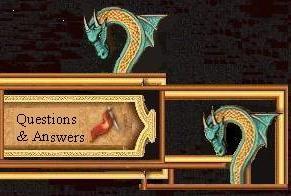
Click On Below Graphic Text For Spy Hunter Introduction

Tournament and Guinness Book Results From 1983-2004
Click On Below Graphic Text For All Video High Scores thru 2004

The Golden Era
Click On Below Graphic Text For Material On The Golden Years Of Video Games 1980's
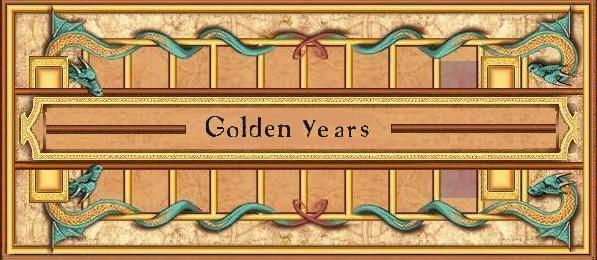
Click the Below Graphic Text to read my Conversations With Walter Day
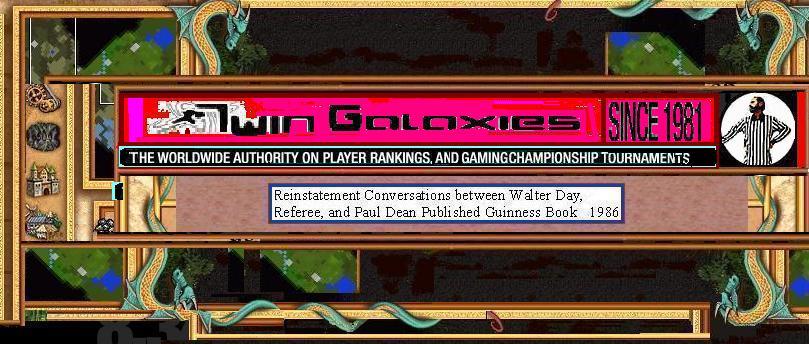
June 9, 2004 Walter Day states, "No Replay Necessary" for Paul Dean

Find A Video Game Auction Near You

Home Page




 Intel - New Technology
Intel - New Technology

 Doom Video Game Get Bad Rap
Doom Video Game Get Bad Rap

 All The Classics Are Back!
All The Classics Are Back!

 Woolworths Department Store, a get together spot for lunch where many seniors met each other.
Wouldn't you like to go back in time and see all of these things again? I'd like
to see an Golden Era Amusement Park with all the old stuff in it including the
Woolworths Chocolate Shakes on the bar stool at the grill with seniors serving who
have been there for 50 years and aren't considered beyond their years. Wouldn't it
be nice to go through a mall that wasn't the same as every other mall all over America,
but instead had some originality with a few independent stores with employees actually
over the age of 18.
Woolworths Department Store, a get together spot for lunch where many seniors met each other.
Wouldn't you like to go back in time and see all of these things again? I'd like
to see an Golden Era Amusement Park with all the old stuff in it including the
Woolworths Chocolate Shakes on the bar stool at the grill with seniors serving who
have been there for 50 years and aren't considered beyond their years. Wouldn't it
be nice to go through a mall that wasn't the same as every other mall all over America,
but instead had some originality with a few independent stores with employees actually
over the age of 18.
 1980's Ghost Busters Monster Theme
1980's Ghost Busters Monster Theme
